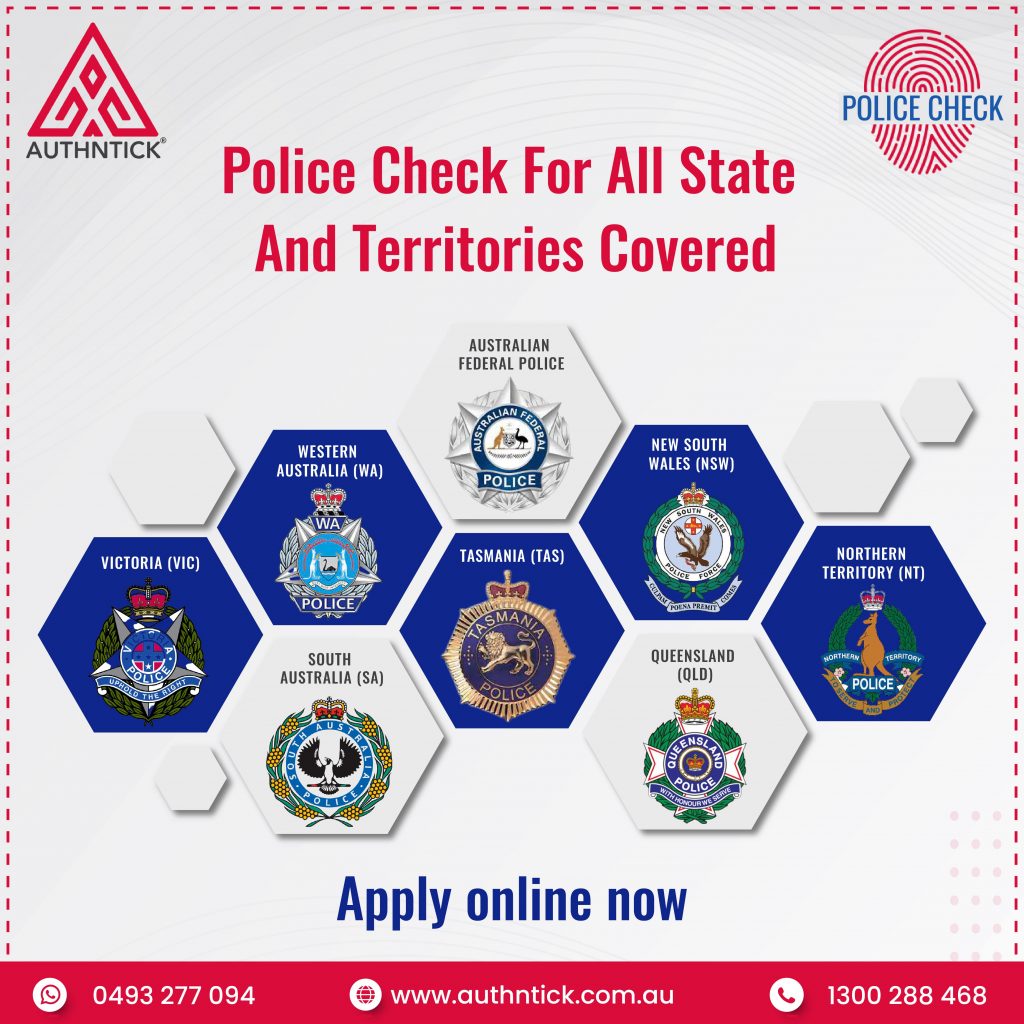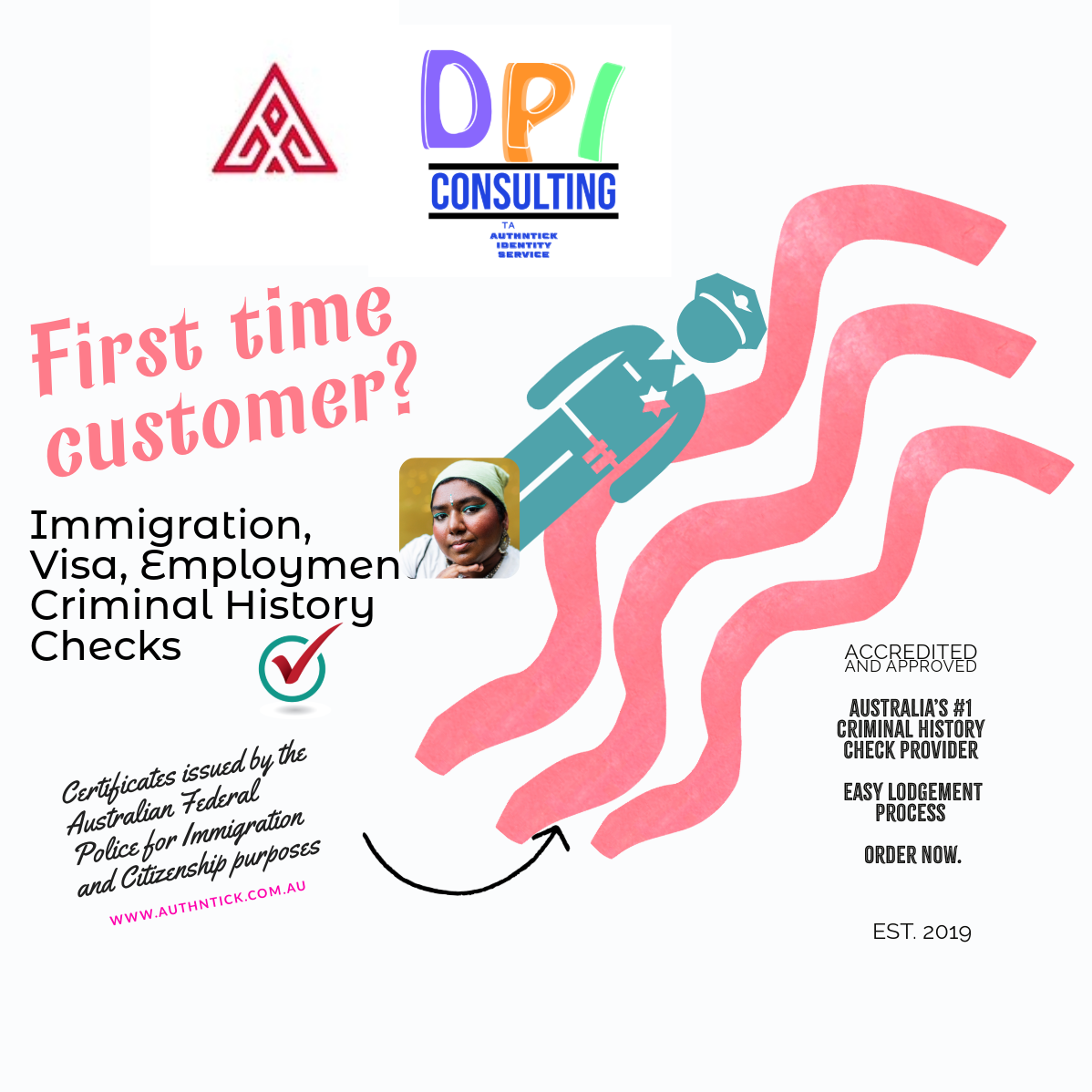All Staff in Australia requires a national police certificate for employment purpose.
Police certificates are required by people who require confirmation of their criminal status and may include
- all staff members
- volunteers
- Trade professionals like electricians, doctors, plumbers, motor mechanics, cleaners etc., on renewal of their licence.
If you are looking for National Police or AFP check for Immigration/Citizenship Visa | Firearms | Age Care | Security Guard you will find them at AuthNTick. Order checks online & skip the line | Cheapest rates in Australia guaranteed
Definition of a staff member
A staff member must be
- At least 16 years old; and
- Is employed, hired, retained or contracted by the approved provider (whether directly or through an employment or recruitment agency) to provide care or other services under the control of the approved provider; and
- Has, or is reasonably likely to have, access to care recipients.

Examples of staff members include:
- key personnel of the approved provider;
- employees and contractors of the approved provider who provide care to recipients (this includes all staff employed, hired, retained or contracted to provide services under the control of the approved provider whether in the residential aged care setting, a community setting or in the care recipient’s own home);
- allied health professionals contracted by the approved provider to provide care to recipients;
- kitchen, cleaning, laundry, garden and office personnel employed by the approved provider either directly or through a contract agency; and
- consultants, trainers and advisors for accreditation support
Definition of non-staff members
Individuals who are not considered staff members include:
- visiting medical practitioners, pharmacists and other allied health professionals who have been requested by, or on behalf of, a care recipient but are not contracted by the approved provider; and
- Visiting tradespeople who perform work, for example, plumbers, electricians or delivery people.
Contractors
Where an approved provider has a contract with an agency that provides staff, the individuals may be considered staff members under the Act, including where suppliers sub-contract work to others. The contract between the agency and the approved provider should state that any staff, provided they are considered staff members, must have a current police certificate that does not preclude them from working.
This includes the requirement that providers who subcontract services to other organisations must be satisfied that the individuals providing the services meet police certificate requirements.
Independent contractors
Tradespeople engaged in providing a service at a date and time determined by the person providing the service do not require police checks. Approved providers have an overarching responsibility to protect the health, safety and wellbeing of care recipients, and independent contractors should be subject to appropriate supervision.
An approved provider can use the following guide to establish if a person is an independent contractor:
- the service provider has an ABN;
- the service provider advertises his or her services;
- the service provider has clients other than the approved provider;
- the approved provider does not determine the working hours and wages of the service provider;
- the approved provider does not make superannuation payments on behalf of the service provider; and
- The approved provider does not pay the service provider holiday pay or sick leave.
The difference between a contractor and an independent contractor is generally decided on the basis of the degree of control that is exercised over the person’s work. A precise determination of whether a contractor is under the control of an approved provider can be difficult, and whether someone is a staff member or an independent contractor is a matter that might ultimately be determined by the courts.
A Contractor Decision Tool is available at: www.business.gov.au to assist employers in determining whether an individual is a staff member or an independent contractor.
Definition of a volunteer
A volunteer is defined as a person who:
- is not a staff member; and
- offers his or her services to the approved provider; and
- provides care or other services on the invitation of the approved provider and not solely on the express or implied invitation of a care recipient; and
- has, or is reasonably likely to have, unsupervised access to care recipients; and
- Is at least 16 years old or, if the person is a full-time student, is at least 18 years old.
Examples of persons who are not volunteers under this meaning include:
- full-time students under the age of 18);
- persons who are expressly or impliedly invited into the aged care service by a care recipient (for example, family and friends of the care recipient); and
- Volunteers who only have supervised access to residents
New staff
While approved providers should aim to ensure all new staff members and volunteers have obtained a police certificate before they start work, the legislation does provide arrangements for commencing work prior to receipt of a police certificate in exceptional circumstances.
A person to start work prior to obtaining a police certificate and pending an assessment of any criminal conviction identified in the certificate if:
- the care or other service to be provided by the person is essential; and
- an application for a police certificate has been made before the date on which the person first becomes a staff member or volunteer; and
- until the police certificate is obtained, the person will be subject to appropriate supervision during periods when the person has access to care recipients; and
- the person makes a statutory declaration stating that they have never been:
- convicted of murder or sexual assault; or
- Convicted of and sentenced to imprisonment for any other form of assault.
In such cases, the approved provider must have policies and procedures in place to demonstrate:
- that an application for a police certificate has been made;
- the care and other services to be provided is essential;
- the way in which the person would be appropriately supervised; and
- how staff supervision will occur in a range of working conditions like night shifts and holidays.
Staff and volunteers who have resided overseas
Staff members and volunteers who have been citizens or permanent residents of a country other than Australia at any time after turning 16 must make a statutory declaration before starting work in any aged care service, stating that they have never:
- been convicted of murder or sexual assault; or
- An individual has been convicted of and sentenced to imprisonment for any other form of assault.
This statutory declaration is in addition to a current national police certificate, as this reports only those convictions recorded in Australian jurisdictions.
Community Visitors Scheme (CVS) volunteers
CVS volunteers are required to undergo a police check, and these are undertaken and assessed by the CVS auspices prior to a volunteer commencing with the program. Community Visitors will provide approved providers with a ‘Letter of Introduction’ confirming the date of expiry of their police check and that they have made a statutory declaration if they have lived permanently overseas after they turned 16. Provided that the letter is current, the home is not required to view the original police certificate or statutory declaration. The home may keep a copy of the ‘Letter of Introduction’ to assist with compliance requirements.


1 thought on “Who needs a police check”
Comments are closed.